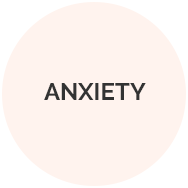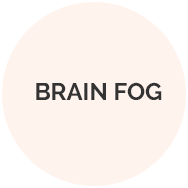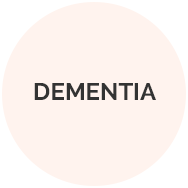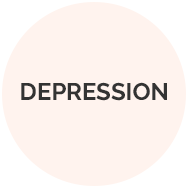Our mood, memory and general wellbeing are all very much dependent on the functioning of our brain cells and the production of brain chemicals. An imbalance in these chemicals can negatively impact our mental health and cognitive ability, potentially leading to symptoms of anxiety, brain fog, dementia, depression and stress.
If you are concerned about your mental health and wellbeing, risk of cognitive decline now or in the future, or maybe you have a family member that has been diagnosed with dementia, you might be interested in finding out more about what The Brain Health Programme has to offer.
About the Brain Health Programme

Click on the conditions below for more information
What is Anxiety?
Anxiety is what we feel when we are worried, tense or afraid. It is a natural human response when we perceive that we are under threat, and can be experienced through our thoughts, feelings and physical sensations.
Most people feel anxious at times. It is particularly common to experience some anxiety while coping with stressful events or changes, especially if they could have a big impact on your life. However, anxiety can become a mental health problem if it impacts on your ability to go about your everyday life as fully as you wish – perhaps your worries are out of proportion to the situation, or you avoid situations that may increase your anxiety altogether.
Types of anxiety
The five major types of anxiety disorders are:
- Generalised anxiety disorder
- Obsessive compulsive disorder
- Panic disorder
- Post-traumatic stress disorder
- Social anxiety disorder
Brain fog
What is brain fog?
Brain fog is a symptom rather than a medical condition in itself. It can be described as a type of cognitive dysfunction involving:
- Poor concentration
- An inability to focus
- Difficulty retaining information
- A lack of mental clarity
- Mental fatigue
Causes of brain fog
Experiencing brain fog is fairly common, but this does not mean that it is normal. The causes of brain fog generally fall into one of two categories — it is either lifestyle-related, or a side effect of a medical condition or medication. Possible causes of brain fog include:
- Chronic stress
- Lack of sleep
- Hormonal changes
- Poor diet
- Physical inactivity
- Medications
- Some medical conditions
![]()
Dementia
What is dementia?
Dementia is an umbrella term used to describe a range of progressive neurological disorders (conditions affecting the brain). It is caused by gradual changes and damage in the brain, which leads to a decline in an individual’s mental and physical abilities. It is important to remember that dementia is not a natural part of ageing. Every day our brain routinely stores the information we need to remember and loses what we do not need to retain. As we age, it is common to take longer to remember things, but there are certain pointers that indicate the problem is more than just natural ageing and is indicative of a disease process.
There are many different types of dementia, of which Alzheimer’s disease is the most common. Regardless of which type of dementia is diagnosed, everyone will experience the condition in their own unique way.
Rates of dementia in the UK
In Autumn 2014, the Alzheimer’s Society published a major study which showed that there are around 850,000 people in the UK with dementia. 1 in 14 people over the age of 65 will develop dementia, and the condition affects 1 in 6 people over the age of 80. The number of people with dementia is increasing as people are living longer, and it is estimated that by 2025 the number will have increased to around 1 million.
In November 2016, figures from the Office for National Statistics showed that dementia is now the overall leading cause of death in England and Wales, replacing ischaemic heart disease.
Types of dementia
There are many different types of dementia, the four most common being:
Alzheimer’s disease
Approximately 60% of individuals in the over 65 age group diagnosed with dementia, will have Alzheimer’s. The exact cause is unknown, but we do know that ‘plaques’ and ‘tangles’ form within the brain due to two proteins (amyloid and tau). Individuals may also have a reduction of acetylcholine – a chemical messenger which carries information to and from brain cells.
Vascular dementia
Approximately 17% of individuals in the over 65 age group diagnosed with dementia, will have vascular dementia. It can be caused by small blood clots which prevent oxygen reaching the brain, or by blocked arteries and burst blood vessels within the brain.
Frontotemporal
This form of dementia is actually more common amongst individuals under the age of 65. Nerve cells in the brain die and the nerve pathways are damaged. This is most likely due to the formation of abnormal proteins that interfere with the communication between brain cells.
Dementia with Lewy bodies
This type of dementia is progressive whereby symptoms gradually get worse over time. Symptoms are similar to Alzheimer’s and Parkinson’s disease. It is caused by a build-up of clumps and proteins in the nerve cells within the brain known as Lewy bodies. This damages the way the nerve cells communicate with each other.
Common symptoms of dementia
The symptoms of dementia tend to worsen with time. It is possible that individuals may experience difficulties controlling their emotions and may lose empathy. Individuals can become uninterested in their usual activities, find social situations challenging, and may lose the ability to fully understand their environment or situations. Symptoms of dementia can include problems with:
- Memory
- Cognitive ability and processing of information
- Communication and engaging in conversation
- Reading and writing
- Personality and mood
- Confidence, particularly within social situations
- Carrying out familiar daily tasks
Different types of dementia exhibit different symptoms according to the part of the brain that has been damaged. An individual may not present with all symptoms at any one point in time, and for some the symptoms may be mild and only get worse very gradually. This can be termed as Mild Cognitive Impairment (MCI) as the symptoms are not severe enough for a diagnosis of dementia to be made. Not everyone with Mild Cognitive Impairment will go on to develop dementia, as for some the symptoms will not worsen. It is important to remember that dementia is not a natural part of ageing, so it is important to seek medical advice if you are at all worried.
To date, simply prescribing medication for dementia has failed to make any real, lasting difference, other than perhaps some short-term symptom improvement. This is most likely because dementia is a condition of multiple causes and is influenced by factors both inside and outside of the body. Whilst dementia may be diagnosed in our 70’s or 80’s, the processes that eventually result in dementia occur much earlier – in our 30’s, 40’s, 50’s and 60’s.
![]()
Depression
What is depression?
Depression can be defined as a low mood that lasts for a long time, and affects your everyday life. In its mildest form, depression can mean feeling in low spirits – it doesn’t stop you leading your normal life, but makes everything seem harder and less worthwhile. At its most severe, depression can be life-threatening.
We all have times when our mood is low, and we are feeling sad, miserable or lacking motivation. Usually these feelings pass, however if they are interfering with your day-to-day life and do not improve after a couple of weeks, or if they come back time and time again, it could be a sign that you are experiencing depression.
Types of depression
If you are given a diagnosis of depression, you might be told that you have mild, moderate or severe depression. This describes the current impact your symptoms are having on you. There are also some specific types of depression:
Seasonal affective disorder (SAD) – depression that usually (but not always) occurs throughout the winter months
Dysthymia – continuous mild depression that lasts for two years or more. Also known as persistent depressive disorder or chronic depression
Prenatal depression – sometimes also called antenatal depression – occurs during pregnancy
Postnatal depression (PND) – occurs in the weeks and months after becoming a parent. Postnatal depression is usually diagnosed in women, but can affect men too.
![]()
Stress
What is stress?
Stress begins in the brain. As information comes in through our eyes and ears it travels to several parts of the brain. When we perceive stress, the body interprets this and processes the threat within the brain. Stress-mediated effects on brain function can be beneficial or detrimental, depending on the type of stressor and the duration of exposure to the stressor. Chronic stress can result in changes to nerve structure and function, as well as the death of neurones, which in turn may accelerate the process of brain degeneration.
Effects of stress on the brain
Levels of the stress hormone cortisol naturally follow a daily rhythm – rising rapidly after waking, falling during the day, rising again late afternoon before dropping to its lowest level in the middle of the night. Chronic increases in cortisol secretion have been found to:
- Induce neurone loss in the area of the brain important for short-term memory
- Increase inflammation
- Lead to mental health problems such as anxiety and depression
- Cause high blood pressure and other vascular factors that are related to Alzheimer’s disease and vascular dementia
- Increase blood sugar, which can lead to insulin resistance and possibly result in brain cells being starved of fuel as glucose is unable to effectively enter cells
- Reduce sleep quantity and quality, which can impair brain function
- Affect gut health, as cortisol supresses gut immunity
When we are not feeling ourselves, or we are under pressure, it can be difficult to make good lifestyle and diet choices – sugary foods may be used as a ‘pick-me-up’, there may be no time to cook, alcohol is used to relax, bedtimes are pushed later, and we rob time from sleep – we then rely on the use of stimulants such as coffee after a poor night’s sleep to help us get going in the morning. This cycle can be broken, and The Brain Health Programme has been designed to show you how.If you are concerned about your risk of cognitive decline, or know someone who is struggling with their mental wellbeing, find out more about how The Brain Health Programme can help.Find out More





